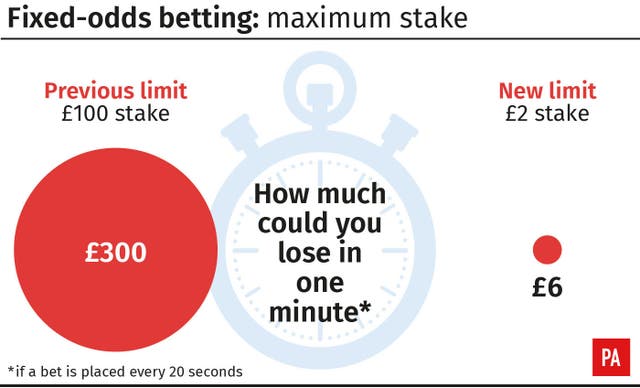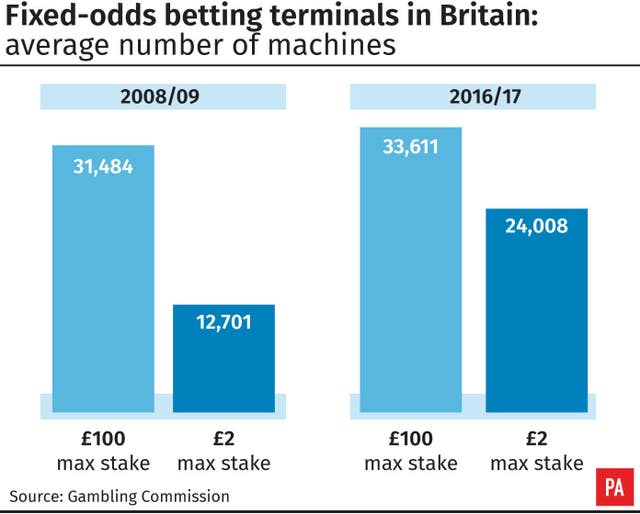Fixed-odds betting machine stakes cut to £2 to end ‘social blight’
Culture Secretary Matt Hancock said he had chosen to ‘take a stand’ by cutting the maximum stake from £100.

The highest stake on controversial fixed-odds betting machines will be slashed to £2 in a move welcomed by campaigners but condemned by bookies amid fears of job losses and shop closures.
The Government said it had chosen to “take a stand” by cutting the maximum stake on fixed-odds betting terminals (FOBTs) – dubbed the “crack cocaine” of gambling – from £100 to £2.
Its decision goes further than the recommendations of a review carried out by the gambling regulator earlier this year, which recommended the maximum stake for FOBTs should be set at or below £30.

MPs across parties joined campaigners in welcoming the decision to crack down on the machines, which can lead to punters placing bets of up to £100 every 20 seconds.
But it comes as a blow to bookmakers, which have warned it would cost betting shop jobs across the country.
The Association of British Bookmakers has predicted more than 4,000 shops could close across the gambling sector, with the loss of 21,000 jobs.
Shares in gambling firms initially fell as the big players estimated the extent of lost revenues and earnings, but the stock losses were later clawed back.
Culture Secretary Matt Hancock said: “When faced with the choice of halfway measures or doing everything we can to protect vulnerable people, we have chosen to take a stand.
“These machines are a social blight and prey on some of the most vulnerable in society, and we are determined to put a stop to it and build a fairer society for all.”

Bookmaker William Hill warned the “unprecedented” decision could see around 900 of its betting shops become loss-making, with a number of those at risk of closure after the new £2 limit comes into effect.
The group said the stake cut could hit annual earnings by between £70 million and £100 million.
It has already recently cautioned that the stake cut could leave it at risk of a foreign takeover.
Ladbrokes owner GVC and Paddy Power also warned over expected hits to their earnings from the loss of lucrative FOBT revenues.
But Tracey Crouch, Minister for Sport and Civil Society, said: “While we want a healthy gambling industry that contributes to the economy, we also need one that does all it can to protect players.”
She added: “It is right that we take decisive action now to ensure a responsible gambling industry that protects the most vulnerable in our society.”

Tom Watson, deputy leader of the Labour Party, was among those who praised the Government’s tough stance.
He said: “It’s not often that the Opposition congratulates a Government minister, but Tracey Crouch has made the right decision today.”
Campaigner Brian Chappell of Justice for Punters added: “These machines were introduced through the back door onto UK high streets. They’ve been trouble ever since.
“This decision means the betting shop environment will become safer for staff and customers.”
The Government has also tasked the Gambling Commission to hold talks with the industry on potential limits on spend and time on other so-called gambling machines in casinos and arcades.
Alongside the FOBT stake announcement, it confirmed a raft of measures to clamp down on gambling, including plans to toughen up online protections, such as introducing stronger age verification rules and affordability checks.
A multimillion-pound advertising campaign promoting responsible gambling will be launched later this year.
And the age limit for playing National Lottery games will be reviewed under the next licence competition.
The Government said it will fund the crackdown through an increase in remote gaming duty.
It pledged to work with the gambling sector to ensure it has sufficient time to introduce the stake reduction and technological changes.
Speaking in the House of Commons, Ms Crouch said she expected the regulations will come before Parliament later this year.
She said: “Mr Speaker, I know that yourself and members of this House will recognise there is a process we have to go through.
“We expect the regulations to come before the House later this year and then with a reasonable time of implementation following that.”





